Big Books: Part One
Gift guide
Fri., Dec. 3, 2004
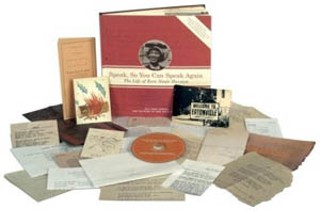
Speak, So You Can Speak Again: The Life of Zora Neale Hurston
by Lucy Anne HurstonDoubleday, $29.95
Frank Lloyd Wright: The Interactive Portfolio
by Margo StipeRunning Press, $40
As cat-butt magnets and Jesus action figures threaten our once-sacred temples of the written word, display space for Items Ex Libris is tight. Novelty and coffeetable books filled yesterday's gift gap, but a new trend in books offers a happy medium between the "sublime" of intellectual stimulation and the "ridiculous" of random consumer addiction. This trend is yet unnamed, but for our purposes, we'll call them "kits."

Book kits are the logical extension of inserting newspaper clippings, photos, or even crushed flowers as time-capsule keepsakes between pages. Like colorful Christie's books loaded with pictures of original artifacts (Personal Property of Marilyn Monroe comes to mind), these kits provide armchair museum tours for aficionado and dilettante alike.
An early purveyor of this format was editor Phyllis Johnson and her multimedia "magazine," Aspen. Published in the mid-Sixties, the third issue was an Andy Warhol-designed, detergent-inspired box loaded with Velvet Underground souvenir reproductions: prints of paintings, LSD trip coupons, a flexi-disc, and more. Perhaps inspired by this now-collectible gem, Chronicle Books released Andy Warhol Pop Box in 2002, a collection of similar Warholana.
This fall, two releases, Speak, So You Can Speak Again: The Life of Zora Neale Hurston, compiled by her niece, Lucy Anne Hurston, and Frank Lloyd Wright: The Interactive Portfolio by Wright archivist Margo Stipe, stand out as fine examples of the new genre's potential.
Feminist icon Hurston is a figure steeped in intrigue. Raised in the all-black Eatonville, Fla., this slacks-wearing, thrice-married Harlem Renaissance dynamo penned the classic Their Eyes Were Watching God. The tokens within this kit – a CD of Hurston's voice in word and song, a reproduction of her hand-designed holiday card, charred drafts, and rare photos – provide a sassy backdrop to a mysterious literary life.
The Wright kit is likewise a personal journey behind the scenes of this architectural god. Culled from the also thrice-married and controversial Wright's official archive, this collection is an unflinching look at the man behind the sketches, personal letters, and blueprints reproduced within. Stipe's prose dignifies serious students of design while not overwhelming the curious or new fan.
There's nothing quite like genuine drafts and scribbles in the author's hand. Now, with these new-fangled kits, fans can hold approximations while walking the fine line between commercial appeal and literary merit. What a great gift idea. Unless, of course, your intended giftee is aching for another cat-butt magnet. – Kate X Messer
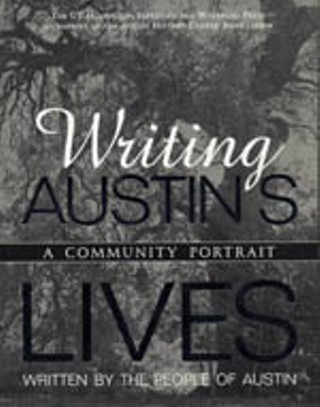
Writing Austin's Lives
by the people of AustinWaterloo Press, 412 pp., $17.95 (paper)
You want to know what a city's like, who you gonna ask? Some sharply tailored real estate booster with a storefront tan and a cash register where his heart should be? Some dope-smoking cholo blasting Las 3 Piratas from the speakers of his lowrider? Some scruffy, patchouli-drenched poet with accidental dreads, a rusty nose ring, and her voice hoarse from one too many open mics? Maybe some old gimme-capped cracker who eats pork rinds while watching endless reruns of Wheel of Fortune? Possibly some African-American professor of feminist theory who wears Birkenstocks and has a lifetime membership to aGLIFF? You really want to know what a city's like, why don't you ask all of them? Or, rather, ask the real people behind and between those stereotypes: Ask as many of the citizens, in all their diversity, as time, energy, and funding will allow. Ask those citizens to write their stories, to give their unique, indivisible perspectives about what it's like living where they live. You think that'll give you a good idea of the urban environment? You think that'll provide a definite sense of place? If you do, you're right. And there's a new book called Writing Austin's Lives for supportive evidence. Writing Austin's Lives is a hefty trade paperback of more than 400 pages, with an elegant foil-embossed cover and an interior of autobiographical, city-centric stories from the variegated spectrum of Austin life. Almost 800 citizens responded to a five-month call for stories from the University of Texas Humanities Institute, responded "in crayon, on thin, yellowed sheets of typing paper, in stacks from teachers and writing groups, in envelopes covered with fancy, old stamps, and in envelopes stuffed with photographs." All ages, all genders, all ethnicities, all social strata, all you-name-it, sent in pieces of their lives. Now 127 of those shards of the human mirror have been joined – thanks to the efforts of the Humanities Institute and the Austin History Center – to offer a multifaceted reflection of this progressive, backward, caring, indifferent, ultimately paradoxical, and ever-changing city by the river. – Wayne Alan Brenner
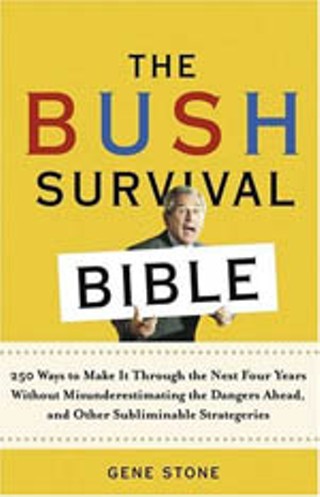
The Bush Survival Bible
250 Ways to Make It Through the Next Four Years Without Misunderestimating the Dangers Ahead, and Other Subliminable Strategeriesby Gene Stone
Villard, 160 pp., $9.99 (paper)
There are weighty books that, when gifted, say, "I thought long and hard to find a substantive and personal present for you." The Bush Survival Bible is decidedly not one of them. This doesn't mean that the thin volume won't make a cute stocking stuffer, but don't be surprised if you visit your friends and find that it's become bathroom reading material. It's clear that the author of the book was cognizant that there was only a 50% chance of its becoming relevant, and the result is a rather inconsistent collection of "advice" from "experts" on how to survive Bush's second term. Most chapters weigh in at fewer than five pages and attempt to counter "post-election stress disorder" with humor, the result of which is pretty hit-or-miss. A chapter titled "9 People Worse Than Bush" implies that reading bizarrely offhand blurbs about totalitarian dictators more evil than G.W. will somehow be soothing. Personally, reading a second-grade-level paragraph about Nicolae Ceausescu's reign of terror over Romania doesn't exactly make me feel cheerier about the world going down the toilet. Another chapter offers Bush-related spoofs on movie titles that wouldn't even be sophisticated enough to make it into Cracked Magazine (it still exists, I checked). Other, more well-intentioned chapters give advice on how to become politically active or, in turn, become an expatriate. Probably a good gift for the somewhat uninformed but earnest teenager in your life. – Jess Sauer
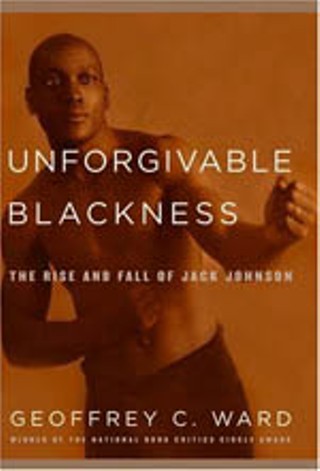
Unforgivable Blackness: The Rise and Fall of Jack Johnson
by Geoffrey C. WardKnopf, 492 pp., $26.95
Weighing in at 492 pages, Unforgivable Blackness is a real contender for the best book of boxing lit since Nick Tosches' The Devil and Sonny Liston. Liston's story is of the Fifties and Sixties, however, while Johnson, born in 1878, came blazing onto the American scene in the first decades of the 20th century – Jim Crow America, that is, when a black man could get lynched for just looking at a white woman. And forget dreaming about actually competing in a white man's sport, even the brutal combat inside the squared circle. Johnson not only became the first black heavyweight champion of the world, but was a white-chick magnet. He flaunted it, openly cavorting with milk-skinned honeys in his hot cars and marrying a few, too. Johnson was an imperfect hero, of course, and the backlash that he flirted with did indeed erupt. But what the hell. A companion piece to Ken Burns' PBS documentary on Johnson, the book is not without its flaws, either, at times glossing over a few of the story's inconvenient nuances, but it's still a knockout. Great writing about American boxers is great American lit, about coming up from small means and accomplishing the impossible, and Ward deserves a TKO here. – Jesse Sublett
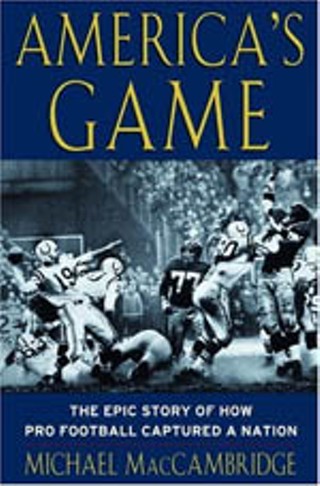
America's Game: The Epic Story of How Pro Football Captured a Nation
by Michael MacCambridgeRandom House, 576 pp., $27.95
MacCambridge opens this fascinating history of the NFL with a quote from Jacques Barzun, who claimed in 1954 that "whoever wants to know the heart and mind of America better know baseball."
Fast forward to a 2003 Harris Poll, and MacCambridge finds that pro football fans now outnumber baseball fans by a two-to-one margin. How did a relatively minor – and extremely violent – sport become America's game? The answer lies in a curious synergy between media monopolies, greedy businessmen, and quasi-socialist policies implemented by the NFL's commissioner-king, Pete Rozelle.
Brace yourself, football fans: The NFL's ascendancy over the sporting landscape has more to do with television and corporate power-brokering (in 1961 CBS secured an antitrust exemption from the Kennedy administration for exclusive rights to all NFL games) than its inherent superiority as a sport. To argue that football looks better on TV, says MacCambridge, "is to argue apples are better than oranges." Equally spurious, MacCambrige claims, is the idea that football "appeals to some deep-seeded bloodlust of the American sports fan."
MacCambridge's provocative history of the NFL focuses more on legendary owners, coaches, and commissioners than on well-known players. To understand the NFL, MacCambridge suggests, one must understand men like Cleveland coach Paul Brown, the namesake of the Cleveland Browns. Brown jettisoned pathos-ridden clichés about "heart," "leadership," and "character" for a scientific approach to the game and his players, whom he submitted to a weekly "flaw report."
"We're taking the guesswork out of football," Brown once said. "We're making a science out of what is called a game."
Put that in your pipe and smoke it, Jacques Barzun. – Russell Cobb








